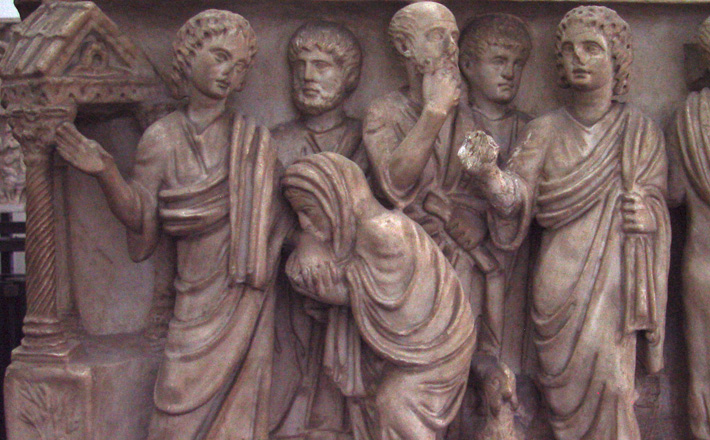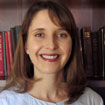Commentary on Hebrews 12:18-29
In a letter that has reverberated with rhetorical force throughout, the end of the twelfth chapter of Hebrews presents the author’s oratorical and theological tour de force.
The audience can feel nothing but awe: Awful fear in remembering God’s presence on Sinai and awe-full thanksgiving in receiving God’s Kingdom on Zion.
Sinai
Before vs. 18, the author issued one of his final and most chilling warnings: do not be like Esau who squandered his birthright and could not undo the consequences (Hebrews 12:15–17). The next section includes his typical comfort after a warning, but it takes him some time to arrive at the comforting part. First, he describes the terror of Mount Sinai.
The scene around this place is ominous for the eye and the ear with burning fire, darkness, gloom, windstorm, noise of trumpets and words being spoken. His collocation of terms echoes the retelling of Sinai from Deuteronomy 4 and 5. The only term he adds to this is zophos, gloom, used elsewhere in 2 Peter and Jude to describe the abode of fallen angels (2 Peter 2:4, 17; Jude 1:6, 13), which only increases the terror of his description. The generation delivered from Egypt was so overwhelmed with this theophany that they begged for Moses to mediate communication to them rather than for God to speak directly (Exodus 20:19). They did not want to be too close (Exodus 20:18) because they knew that God had commanded that anything would die if it touched this mountain (Exodus 19:12). Hence, the fact that the author begins his description with the reality that this mountain could be touched (pselaphow) only increases its mortal danger. It seems right that both the people and Moses were afraid. This terror, however, is in the past; the audience of Hebrews has not approached this mountain. Instead, they have come to Mount Zion.
Zion
In the scriptures of Israel, Zion refers to the city of David, the elevated capitol of Jerusalem. This is the city that belongs to the living God, and while those words alone might indicate the earthly tabernacle or temple, the author clarifies with the next phrase that this Jerusalem is a heavenly one. Although some texts of the Old Testament will describe the abode of God as Zion (Psalm 50:2; Joel 3:17; Isaiah 8:18), only the author of Hebrews specifies that this Jerusalem is explicitly heavenly. This affirms his earlier interest in a city not of this world (Hebrews 11:10, 13–16).
The first residents the author describes are the throngs of angels in celebration. If the author was concerned to make sure his readers viewed Christ as worthy of more glory than angels in chapter 1, his diminution of the angels is not so vitriolic that he would not recognize their presence in this heavenly kingdom. The angels who serve humanity while they are on earth (Hebrews 1:14), will someday celebrate with together with them.
Their human partners in conviviality he describes as an assembly (ekklesia). This is a term modern Christians are used to associating with the church, meaning literally, the called out ones. Ekklesia also appears in Deuteronomy 4 (4:10 LXX), the chapter the author has been using to retell the story of Sinai.
What is most striking is that the author associates this assembly with the firstborn. One might expect the author to describe this assembly as belonging to the firstborn, a term he has used to describe Jesus (Hebrews 1:6). Instead, this is an assembly made of up firstborn ones. His use of the plural grabs the reader’s attention. It falls to only one child in a family to be the first born, but here, those who come to the city of God can all be afforded the honor of being the firstborn. With this term, the author explicitly offers a comfort to his warning in chapter 12. Esau was willing to give up his rights as the first born (prototokia), but the readers approach the mountain where all retain that identity and the incumbent rights.
Finally, this assembly consists of people who have been registered in heaven, a common theme in texts that deal with the end of all things like Revelation (the book of life in Revelation 20:12). The notion of writing might also echo to the New Covenant where God has written his laws on the hearts of his people (Hebrews 8:10; 10:16), especially since a reference to the covenant appears in the next verse.
At this point, the author says explicitly that God resides there. In a text that contrasts the fear of Sinai with the joy of Zion, it might seem more fitting to describe the grace or love of God, but that is not the case. Instead, those who approach this mountain come into the presence of God who is the judge of all. Harkening back to the fearful image of all creation laid bare before the eyes of God’s word (Hebrews 4:13), this title asserts that God has not changed but access to Him has.
This would seem a chilling place to end, but then the author mentions two more entities on this mountain, alternating again between the human and the divine. The spirits of the righteous who have been made perfect refers to the humans (notice how God is called the Father of spirits in Hebrews 12:9) who have endured God’s fatherly training and reached their perfect end (Hebrews 12:5-11). Then, a reference to Jesus and his blood stand at the end, as that which allows all of them to approach God the judge as righteous, perfect, firstborn children. By comparing Jesus’ blood with that of Abel, the author unites the last section of his discourse, from Hebrews 11:1 to 12:24. The company of the faithful beckons the community to continue on toward this mountain.
Speech from the mountain
The readers of Hebrews have approached the right mountain, but they have not ascended it. The author continues in his awe-some tone by warning them to pay attention to the God who is speaking to them from Mount Zion. They know what happened to the Israelites who did not want to hear from God.
As they are poised at the end of the ages, God will soon, with his voice, shake all things. God has given them a Kingdom that cannot be shaken, which likely refers to this heavenly Jerusalem. Their response should be one of thanksgiving and service, with reverence and fear. Awe must remain the mode of their approach because God remains fiery, as he was on Sinai. His fire consumes his enemies (Hebrews 12:29/Deuteronomy 4:24; 9:3), which they are not, but which the author gravely warns them not to become. He doesn’t want them to miss out on dwelling forever on such a mountain.


August 21, 2016